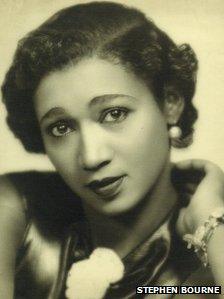Plaque honour for 'first black star' Elisabeth Welch
- Published

Elisabeth Welch's recording career spanned eight decades
The singer Elisabeth Welch is to be commemorated with an English Heritage blue plaque in south-west London.
She is the second black woman to be honoured with a blue plaque in London.
It will be unveiled in Ovington Court, Kensington, which was her home during the 1930s when she rose to fame on the cabaret circuit.
The performer died aged 99 in 2003 and has been described as "Britain's first black star".
Paul Reid, Director of Black Cultural Archives said it was "an important moment for black heritage".
Welch was born in New York in 1904, but lived in London for 70 years.
She made her stage debut in 1922 and her final professional appearance in 1996.
In 1923 she launched the Charleston on Broadway.
She was associated with great entertainers including Josephine Baker, Adelaide Hall and Bill "Bojangles" Robinson, said English Heritage.
In 1931 she popularised Cole Porter's song Love for Sale in the Broadway hit The New Yorkers and after settling in London.
In 1933, she introduced the famous torch song Stormy Weather to British audiences.
Howard Spencer, blue plaques historian at English Heritage, said: "Welch described herself simply as a 'singer of popular songs' but for her many fans she achieved the status of a living legend.
"In the words of one obituary, she 'belonged to an elite group of singers who gave definitive shape to the works of the Gershwins, Cole Porter, Jerome Kern, Noel Coward and other songwriters of the golden age'."
Mr Reid said: "Elisabeth Welch lived a fascinating life in theatre, film and music.
"Black Cultural Archives are delighted that she has been awarded a plaque, becoming only the second black woman to be so honoured."
The memorial will be unveiled by the playwright, author and critic, Bonnie Greer.
The first black woman to be honoured with a plaque was the nurse Mary Seacole in 2005.
The London-wide English Heritage blue plaques scheme has been running for 140 years to commemorate the link between notable figures of the past and the buildings in which they lived and worked.